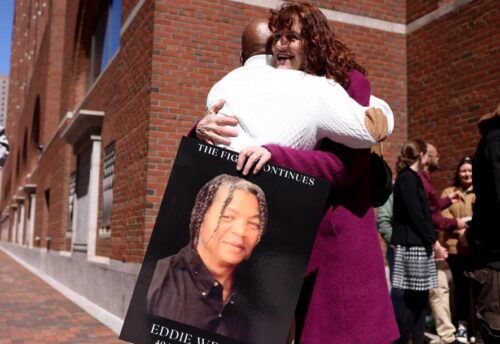It is the Trump administration’s latest threat against Harvard: If the university doesn’t turn over disciplinary records of foreign students, the federal government could take away its right to admit students from abroad.
Homeland Security Secretary Kristi Noem issued the warning Wednesday. Accusing Harvard of “bending the knee to antisemitism’’ and tolerating “anti-American, pro-Hamas ideology,’’ she said that problematic foreign students and faculty must be rooted out.
Harvard is perhaps the world’s best-known university, the consummate global institution of higher education in the US. Foreign students make up more than one-quarter of its student body. So, without students from all over the world, would Harvard still be Harvard? And what would happen to the thousands of international students who have jobs, degrees, and futures on the line if the US government sends them all home?
“One of the great advantages that American higher education has is that we attract the best and the brightest students from around the world,’’ said Ryan Enos, a Harvard professor of government, “They come here, they make discoveries, they enrich our classes and our laboratories, and essentially we would be cutting that off.’’
Some of Harvard’s international students, and their American classmates, have begun to fight back. At midday Thursday, hundreds of students and professors holding signs with slogans like “PATRIOTS STAND UP TO TYRANTS’’ and “FREE SPEECH INCLUDES PALESTINE’’ gathered in Harvard Yard.
“When they come for us, they’re coming for every single one of us,’’ said Abdullah Shahid Sial, a Harvard student from Lahore, Pakistan, in a speech outside Harvard’s Memorial Church.
“If we cave in, if we cave in even a little bit, we are surrendering to the regime. And that’s what they want. They want us to turn on each other. And now more than ever, we need to have each other’s backs.’’
Many international students have opted to avoid sharing their stories or views publicly to avoid retaliation from the Trump administration. The arrest and detention of Columbia graduate student Mahmoud Khalil, a pro-Palestinian activist, and Tufts University doctoral student Rümeysa Öztürk, who remains in detention in Louisiana, apparently because she coauthored an op-ed critical of Israel last year, has made them terrified about speaking out.
But Sial and Leo Gerdén, a senior from Sweden, are speaking out publicly against the administration. Both know they are risking potential revocation of their visas, detainment, even deportation.
The administration has created a chilling effect in international student circles. Some are looking over their shoulders to see if they’re being followed, carrying their immigration paperwork with them at all times, asking to have their names removed from news articles, even moving out of the campus dorms listed on their paperwork.
Sial and Gerdén, though, have taken a different approach.
Gerdén, who is from Stockholm and is scheduled to graduate next month with a degree in economics and government, also spoke at the rally, urging Harvard leadership not to give in to these latest demands.
He also recently wrote an op-ed in the Crimson, the school’s student newspaper, a notable choice, as other international students including Öztürk reportedly had their legal status put in jeopardy after writing or co-signing letters and opinion pieces.
“It’s a risk I have accepted because I think that self-silencing is the most dangerous response to authoritarianism,’’ Gerdén, 22, said after his speech Thursday. “We cannot let that fear overwhelm us.’’
Enos said the feeling on campus has been a mix of satisfaction Harvard is “fighting back’’ along with fear for what could come.
“What [President Trump] is interested in is quashing dissent at universities,’’ he said. “He wants to take away universities as independent organizations in a free society. And I think if we look around one day and we realize that this great advantage we had, which is people would come from all over the world to study at these places, and that we voluntarily took that away, it’ll be one of the greatest regrets we have as a nation.’’
In its directive Wednesday, the Department of Homeland Security said Harvard faces losing its ability to enroll international students if it does not turn over records of international students who have been arrested or have engaged in protests.
“If Harvard cannot verify it is in full compliance with its reporting requirements, the university will lose the privilege of enrolling foreign students,’’ DHS said.
At Harvard, at least 12 students and recent graduates have had their visas revoked, according to the university. Nationwide, nearly 5,000 students and former students have had their legal student status terminated by the Department of Homeland Security, according to the American Immigration Lawyers Association.
Some students who’ve had their visas revoked say they have not had any contact with the criminal courts and did not participate in campus activism. Others have pending criminal cases or charges that were dismissed. And a number of students have already chosen to leave the US, immigration attorneys say.
The visa revocations come as the Trump administration tries to force policy changes on Harvard and impose additional oversight over its governance and academics. In response, Harvard took the extraordinary step this week of saying that it would not comply with the administration’s demands.
In retaliation, the Trump administration froze more than $2 billion in federal funds tied to the university, is preparing to revoke the university’s tax-exempt status, and is threatening its ability to enroll international students.
Sial, the 20-year-old Harvard student from Pakistan, is the eldest of three siblings, and comes from Lahore, Pakistan’s second-largest city.
He got a scholarship to high school, and is the first in his family to study in the US, majoring in economics and applied mathematics.
His acceptance by Harvard was a “joyous occasion,’’ for his family, Sial said in a recent interview, “an accumulation of all the work my parents put in.’’
“It wasn’t even in the wildest of my dreams, the wildest of my family’s dreams,’’ he said.
His father, an electrical engineer, is one of eight siblings born to a family of farmers. His mother was a schoolteacher for many years. Sial said he plans to dedicate his life to public service. Now, he said, his morals have compelled him to help lead the student response to the Trump administration’s demands.
“This is way bigger than international students, it’s way bigger than Harvard international students,’’ Sial said Thursday morning, as he was preparing to speak at the protest on Harvard’s campus. “People need to realize that we are just being played as poker chips right now.’’
Gerdén feels he is in a better position to speak up than many other international students, as he is nearly finished with school and is not planning to stay in the US after graduation. Instead, he intends to spend a year in China, studying for a master’s in global affairs, on a scholarship through a private US foundation.
On Saturday, Gerdén and Sial also addressed hundreds at a rally on Cambridge Common to support students.
“My decision here to speak was not made without fear,’’ Sial told the crowd. His international peers, he said, felt “threatened’’ to speak — afraid to protest, travel, and post on social media.
“Silence, they’re told, is a safer option,’’ Sial said, his voice booming across the Common. “And whenever self-censorship is a more rational option, there’s something fundamentally wrong.’’
Tonya Alanez and Mike Damiano of the Globe staff contributed to this report.
Giulia McDonnell Nieto del Rio can be reached at giulia.mcdnr@globe.com. Follow her @giuliamcdnr.
Spencer Buell can be reached at spencer.buell@globe.com. Follow him @SpencerBuell.
Nick Stoico can be reached at nick.stoico@globe.com


